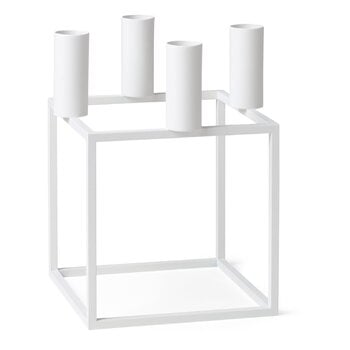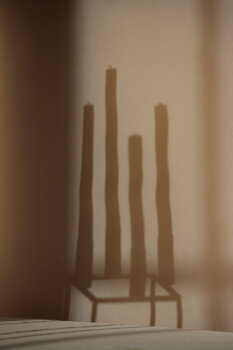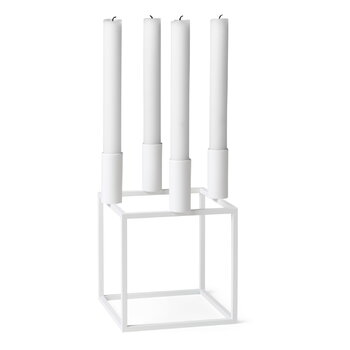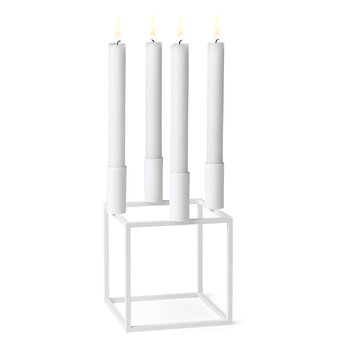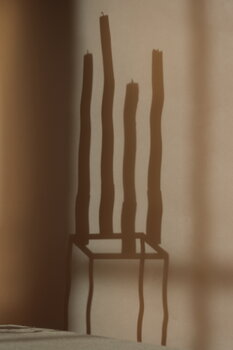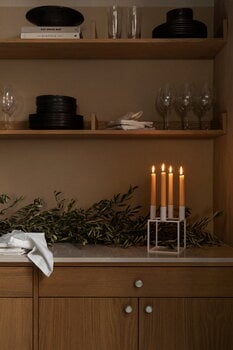Audo Copenhagen's Kubus candleholder was designed in 1962 by the Danish architect and designer Mogens Lassen. Lassen, inspired by the Bauhaus movement, wanted to protest against excessive ornamentation and created a geometric, sharp-edged and stripped-down candleholder. Over time, Kubus has become one of the classics of Danish design, delighting both homes and public spaces with its minimalist elegance.
Kubus 4 candleholder, white
Audo Copenhagen
Description
Audo Copenhagen's Kubus candleholder was designed in 1962 by the Danish architect and designer Mogens Lassen. Lassen, inspired by the Bauhaus movement, wanted to protest against excessive ornamentation and created a geometric, sharp-edged and stripped-down candleholder. Over time, Kubus has become one of the classics of Danish design, delighting both homes and public spaces with its minimalist elegance.
Product details (6)
- Material
- Powder coated zinc alloy
- Colour
- White
- Length
- 14 cm
- Width
- 14 cm
- Height
- 20 cm
- Weight
- 1.25 kg
- Product ID
Designer
The Danish architect Mogens Lassen (1901-1987) was a pioneer of Danish functionalism. In 1927 he left to work for an engineering company, but he did not enjoy the work nor speak French. Paris however changed Lassen’s view on architecture and when he returned to Denmark he established his own studio.
Read moreReviews (3)
5
Based on 3 reviews
-
S
Susanne F
United States
Always hoped to own one, now I do. Thank you, the price was affordable since it was on Sale. Love it, a classic. Shipping was fast and order arrived very well packaged.
255 days ago
-
A
anonyymi
Oulu, Finland
Tämän ajan kynttelikkö
407 days ago
-
A
anonyymi
Jyväskylä, Finland
414 days ago
Sustainability
The Product Sustainability Framework, our criteria of sustainable design, helps you find the most sustainable products in our selection. Read below which sustainability criteria this product has met.
Working conditions & labour 7/9
-
Equal opportunities for all employees
-
Commitment to UN Global Compact, fair compensation for all employees
-
Corporate responsibility requirements defined and communicated for suppliers
-
Systematic work for improved inclusion and well-being in the workplace
-
Transparent supply chain
-
Suppliers' compliance to a code of conduct ensured
-
Compliance to the UN Guiding Principles on Business and Human Rights ensured in the supply chain
Eco-friendly production 8/9
-
Fair and resource-wise water-use in production
-
No incineration or landfilling of returned items
-
No use of endangered species as materials
-
No direct environmental emissions or waste (excl. GHGs) from production
-
The sustainability of direct suppliers' production is addressed and monitored
-
Production and material sourcing that respect biodiversity, animal rights, and natural ecosystems
-
Material-efficient and ecological packaging
-
No potentially harmful chemicals used in own production
Climate impact 4/8
-
Company's direct greenhouse gas emissions identified and commitment to reduction
-
Product's carbon impact identified and commitment to reduction
-
Guidance on energy- and eco-efficient use of the product
-
Carbon footprint of the product calculated and goals set to reduce it
Sustainable materials 6/6
-
Sustainable and long-lasting material choices
-
No harmful or hazardous substances
-
Responsible raw material sourcing and production
-
Materials suited for circularity: monomaterials, recyclable finishings, renewable or recycled contents etc.
-
Ecological materials: natural, biodegradable, recyclable or recycled contents
-
Outstanding materials in terms of innovativeness, responsibility, sustainability and circularity: local production or sourcing, 100 % recycled content, C2C-certification etc.
Circular design 4/5
-
High aesthetic quality promoting long-term use of the product
-
Technically durable product design and material choices
-
Design for enduring life-long quality
-
Design and support for product maintenance, repair and upgradability
